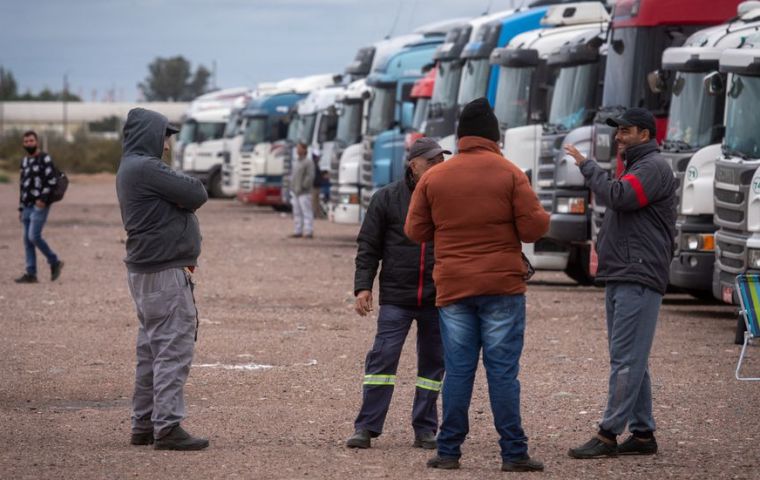MercoPress. South Atlantic News Agency
Trucks blocking trans-Andean traffic now add up to 3,000
 Negotiations are going on but solutions seem to be nowhere near
Negotiations are going on but solutions seem to be nowhere near The conflict involving lorries trying to cross from Argentina into Chile through the Cristo Redentor-Libertadores pass has now escalated to the point of involving some 3,000 trucks stranded in the middle of the Andes, allegedly due to ultra meticulous sanitary requirements on the Chilean part.
The whole issue began more than a week ago, when health protocols were changed unilaterally. Argentina's Foreign Ministry requested the “prompt normalization and streamlining” of circulation, while the Argentine Federation of Freight Transport Entities (Fadeeac) denounced drivers were treated disrespectfully by migrations authorities, due to which they decided to cut off the road in reprisal.
Since mid-January, Chile mandates testing 100% of the lorry drivers who cross the border, in addition to requiring a negative PCR test from before the beginning of the journey. But to test all drivers, Chile has deployed only five positions which can test up to five drivers every half hour, after which they are kept waiting for the results to be allowed into the country.
In addition to this, Chilean customs are understaffed due to COVID-19 cases.
“We want a concrete measure that solves not only the delays, but also the treatment that the drivers are receiving, who have been locked up in tiny rooms without medical attention and for several hours. Until there is a response from the neighboring country, we suggest that companies not send cargo to Chile,” said Daniel Gallart, president of the Mendoza Truck Owners Association (Aprocam).
Chile's measure has cut down the number of daily trucks crossing into Chile to drop from about 1,000 to merely 150. Each truck stopped at the border crossing represents an extra cost of US$700 per day, according to the drivers.
As a form of protest, drivers heading from Argentina to Chile decided to cut off traffic in the opposite direction. “We made the decision to support the cut and that trucks do not circulate in the Chile-Argentina direction either so that, in some way, Chile feels the disorder and the problem that exists,” Gallart said.
”This situation not only harms Argentine companies and drivers, but also other countries in the region that are part of the ATIT (Application of the International Land Transport Agreement),” said Silvia Sudol, head of Fadeeac's International Transport area, since Brazilian, Paraguayan, Uruguayan and Bolivian carriers also use this route to reach ports on the Pacific shore.
Sudol also pointed out the issue was being analyzed within Mercosur's International Freight Transport Business Council.
Last Friday, Argentina's Foreign Ministry asked Chilean authorities for a prompt solution to the problem, which also affects border crossings through Chilean territory between the Argentine provinces of Tierra del Fuego and Santa Cruz.
“We highlight the importance of addressing this type of conflict jointly with the authorities responsible for international freight transport. It is urgent to find a solution for an issue that causes significant economic and social damage to companies and drivers”, said Roberto Guarnieri, president of Fadeeac.
The truckers have developed kitchens and showers to spend their long hours in the middle of the Andes while the crisis is worked out. But these precarious resources are not enough, the truckers have complained.
Chilean authorities have replied that they were discussing the ongoing problems with Argentine Federation of Business Entities of Freight Transport (Fadeeac) leader Nicolás Monckeberg.




Top Comments
Disclaimer & comment rulesCommenting for this story is now closed.
If you have a Facebook account, become a fan and comment on our Facebook Page!